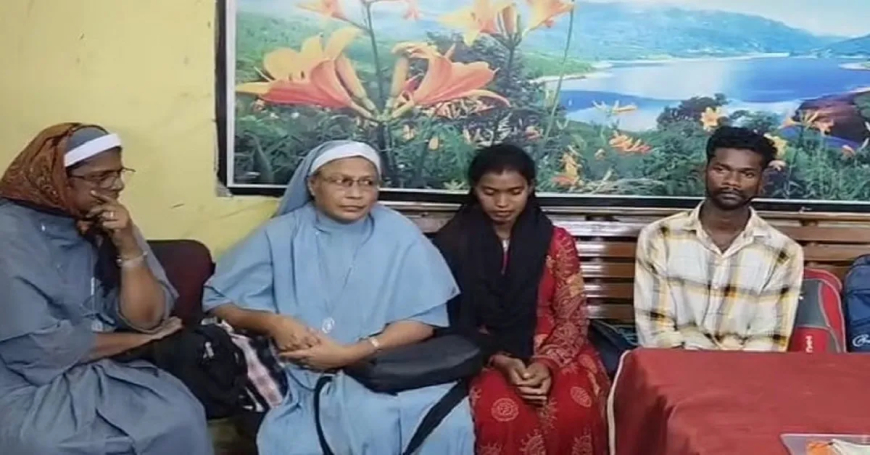Nation Divided: Kerala Nuns’ Arrest in Chhattisgarh Sparks National Uproar, Political Rift and Legal Drama
The arrest of two Kerala nuns in Chhattisgarh for alleged forced conversion and trafficking has triggered nationwide protests, political clashes, and a deep debate on religious freedom and minority rights in India.

🧨 Introduction: A Case That Shook Two States
The arrest of two Catholic nuns from Kerala in Chhattisgarh last week has ignited a nationwide debate around religious freedom, tribal rights, and the politicization of anti-conversion laws in India. What began as a legal case in a small railway station has rapidly snowballed into a complex national controversy involving the Bharatiya Janata Party (BJP), opposition leaders, Christian communities, and civil society.
The nuns — Sisters Preethi Mary and Vandana Francis of the Assisi Sisters of Mary Immaculate — were arrested along with another companion on July 25, 2025, at Durg Railway Station in Chhattisgarh while escorting three young tribal women for a nursing job training program in Agra. The Chhattisgarh police charged them with human trafficking and forcible religious conversion, citing violations under Section 143 of the Bharatiya Nyaya Sanhita and Section 4 of the Chhattisgarh Freedom of Religion Act, 1968.
⚖️ Legal Status: No Bail, Transferred to NIA Court
Despite repeated appeals, bail has been denied by both the Lower and Sessions Court, which have referred the case to the NIA Special Court in Bilaspur. The denial has further inflamed protests in Kerala, with many describing the legal process as excessive and politically motivated.
Lawyers representing the nuns argue that parental consent documents were provided, and the women had voluntarily opted for vocational training. The Chhattisgarh police, however, maintain that the women were being misled under the guise of employment, and conversion was a likely motive.
🏛️ BJP’s Two-State Conflict: A Tale of Contradiction
The arrest has brought into sharp focus the ideological rift within the BJP itself.
🔴 BJP in Chhattisgarh
Chief Minister Vishnu Deo Sai doubled down on the arrests, stating the case reflects a “genuine concern” over tribal exploitation and religious conversion. "This is about protecting our daughters from being trafficked and brainwashed," he said, defending the application of strict legal provisions.
🟠 BJP in Kerala
In stark contrast, BJP leaders in Kerala have taken a more moderate stance. Union Minister George Kurian criticized the manner of arrest and expressed concern for the nuns’ wellbeing. BJP state spokesperson Anil Antony clarified that the issue was “a local misunderstanding”, advocating for a swift legal resolution. This divergence within the ruling party has left observers questioning the consistency of the BJP's national policy on minority rights.
🔥 Political Uproar Across India
Kerala Chief Minister Pinarayi Vijayan:
In an emotional press briefing, CM Vijayan called the arrests "a deliberate act of harassment against Christians," and accused the BJP government of weaponizing religion to target minorities. “There is no forced conversion here. The girls were adults, and everything was consensual,” he added.
Congress, CPI(M) & UDF:
-
Leader of Opposition V. D. Satheesan condemned the arrests as “a violation of constitutional freedoms.”
-
CPI(M) leader M. V. Govindan accused the BJP of “pushing the Sangh Parivar's core agenda” through state machinery.
-
Protests have also erupted in the Lok Sabha and Rajya Sabha, where opposition MPs staged walkouts demanding immediate release and judicial review.
✊ Civil Society, Church & Global Solidarity
Protests:
Mass protests have erupted in multiple Kerala districts including Angamaly, Kochi, Thiruvananthapuram, and Belgaum. Demonstrators included clergy, laypersons, and student groups carrying placards that read: “Protect our Sisters,” and “Stop Criminalizing Compassion.”
Religious Leaders React:
-
Cardinal Baselios Cleemis, head of the Syro-Malankara Catholic Church, said the arrests are “a symptom of rising religious intolerance.”
-
Kerala Catholic Bishops’ Council (KCBC) and Catholic Bishops’ Conference of India (CBCI) have called it an “outrage against faith-based humanitarian work.”
National Minority Commission:
Sources suggest that the National Commission for Minorities has taken suo motu cognizance and may initiate an independent fact-finding mission to Chhattisgarh.
👁️ Ground Reality: Who Are the Girls?
All three tribal girls have reportedly told the court and media that they chose to travel of their own will and were not being coerced. They were aspiring nurses from Narayanpur district, and their families had signed consent forms for their vocational training.
However, right-wing groups in the region accused the nuns of using “employment as a front for mass conversion,” alleging links to previous incidents involving Christian groups in Bastar and Dantewada.
📜 Anti-Conversion Law Under Scrutiny
The Chhattisgarh Freedom of Religion Act, 1968 has often been critiqued for vague definitions and wide discretionary power to the police. It criminalizes “allurement-based” or “forceful” conversions — terms critics argue are too subjective and often abused to harass minority communities.
This incident, like others before it, has reignited debates about religious liberty vs social protection, and the role of state governments in interpreting conversion-related activities.
🧭 What’s Next?
-
Next bail hearing at NIA Court, Bilaspur is scheduled for August 5.
-
CPI(M) and Congress are planning joint protests on August 3–4 in major cities.
-
The Church may approach the Supreme Court, citing violation of Article 25 (Freedom of Religion).
📌 Final Word
The arrest of Sisters Preethi Mary and Vandana Francis is no longer just a legal case — it is a mirror reflecting India’s ongoing struggle to balance religious freedom, tribal protection, and law enforcement. As the political temperature rises, so too does the public demand for justice, transparency, and constitutional adherence.




















































